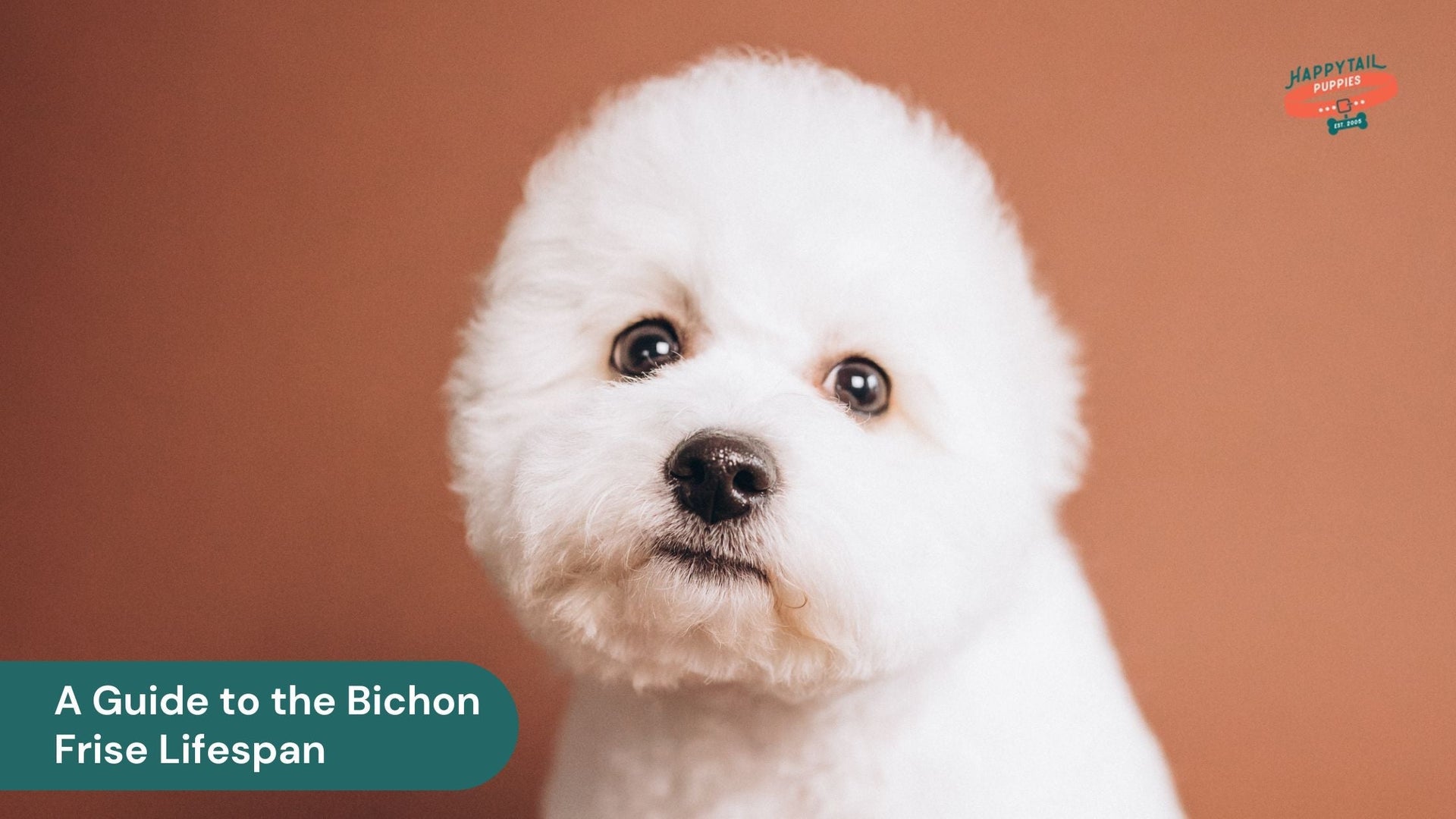A Guide to the Bichon Frise Lifespan and How to Maximize It
The average Bichon Frise lives 12-15 years, but owners can help maximize their pup’s lifespan by providing proper care, nutrition, and love.
Once you have had an opportunity to see a Bichon Frise face-to-face, you will understand how easily you fall in love with it. Those springy steps that come near you with shining bright eyes, and not to mention how it snuggles into your lap, are the things that make it impossible not to love them. These puppies are not just pets; they're your friends with fur, who embrace your heart with fur!
To pet owners, making an unforgettable memory is inevitable. The best approach to creating realistic memories is to learn as much as possible about the various factors that directly affect the Bichon Frise lifespan.
A Critical Insight into A Bichon Frise’s Lifespan
The Bichon Frise is considered a relatively long-lived breed for its size. The Bichon has a lifespan of 12 to 15 years, although it can live up to 18 years with proper care and maintenance. Genetics, environment, and level of care have a significant influence on how long they stay by your side.
According to the American Kennel Club (AKC), by providing them with proper veterinary care, balanced nutrition, and continuous attention to their overall health, their lifespan can be significantly extended.
Regular exercise, proper nutrition, and regular grooming are essential to their overall health. These small dogs are happy when their coat, teeth, and ears are in good condition. In addition to ensuring the Bichon Frise's life expectancy, proper care also ensures their overall comfort.
The Bichon Frise is a relatively long-lived breed. Bichons typically live 12 to 15 years, but with proper care and maintenance, they can also live up to 18 years. How long they remain with you depends mainly on their genetics, the environment, and the care they receive.
According to the American Kennel Club (AKC), they can live a long life when provided with proper veterinary care, healthy food, and regular attention to their overall health.
They need to exercise regularly, eat well, and groom periodically to ensure that their health is maintained. These miniature dogs are cheerful when their fur, teeth, and ears are well kept. Besides taking good care of these pups, proper care helps ensure that a Bichon Frise's life expectancy is maximized.
Key Factors That Influence the Bichon Frise Lifespan
One of the most common questions pet parents have concerns their furry companion's actual lifespan. The answer is a combination of genetics, lifestyle, and preventive care. We will explore the most significant factors influencing longevity and how owners can ensure their Bichon lives the best life possible.
Maintaining Long-Term Bichon Frise Health
Preventive care plays a crucial role in the Bichon Frise health. Veterinary check-ups, vaccinations, and parasite prevention are the cornerstones of a long, healthy life. Because some genetic disorders, such as hip dysplasia, allergies, and cataracts, can strike this breed, early diagnosis makes treatment easier. Owners who stay proactive about addressing minor problems before they become significant issues give their dog the best chance to live a longer, healthier life.
Just as important as the classroom environment is a supportive home environment. Bichons are highly social and can become stressed if left alone for too long. Stress and loneliness can contribute to impaired immunity, and providing them with attention and play does help them stay strong and happy.
The Importance of a Balanced Diet
A balanced diet is suitable for all ages. Feeding a high-quality dog food formulated for small breeds will ensure that Bichons are getting the proper balance of proteins, vitamins, and minerals. Researchers who learn about bichon frise facts also discover the connection between diet and coat health, energy levels, and longevity. Eating in moderation and avoiding excess treats can prevent obesity, which is a significant risk factor for heart disease and joint problems. A diet high in antioxidants and omega fatty acids will also help maintain cognitive function and coat health as they age.
According to the Association for Pet Obesity Prevention, a whopping 59 percent of dogs in the United States were considered overweight or obese in 2022, highlighting the importance of portion control and balanced feeding in promoting a longer life span. Many owners visit a veterinarian to make diet changes based on whether the dog is a puppy, adult, or senior. Supplements, such as probiotics or glucosamine for joints, when prescribed by a healthcare professional, can be beneficial.
Exercise and Mental Stimulation for Longevity
Regular exercise is the key to keeping your pup in spirits and better health. Although typically a small breed, the Bichons have a higher level of energy that loves to go for regular walks, play fetch, and engage in agility activities. Pet parents caring for mixed breeds, such as a Teacup Shih Poo, will find similar benefits in the consistent level of activities, which increases cardiovascular resilience and maintains their general well-being. Regular exercise can help prevent obesity while supporting the joints in optimal condition for a long time.
Mental enrichment is equally essential. The training sessions, puzzle toys, and new experiences add to their mental stimulation. This eliminates their boredom behavior, such as excessive barking or chewing, promoting a state of positive emotions.
Grooming and Hygiene Routines
Grooming is not just about keeping their aesthetics in top condition. Bichon Frises are known for their curly and thick coats, which demand frequent brushing to prevent matting. Matting traps dirt, which can cause skin infections. The professional grooming sessions, held every four to six weeks, can keep your pups comfortable, ensuring their skin is in better health.
Pet parents often compare grooming expenses to the ownership cost of a Bichon Frise, as maintenance is a primary factor in caring for this breed responsibly. Adequate ear cleaning helps prevent infections, in addition to dental care that shields against periodontal diseases, which can reduce the lifespan of these conditions.
According to the American Veterinary Medical Association (AVMA), the majority of dogs display signs of periodontal disease by the time they are three years old, making it an integral part of a dog's long-term health to ensure that dental care is incorporated into their grooming routine. Regular dog grooming also provides an opportunity to inspect for lumps, bumps, or other abnormalities. Stick to these routines, and pet parents are more likely to notice changes sooner, which contributes to bichon frise life expectancy.
Understanding Genetic Predispositions
Although generally healthy, Bichons are prone to developing certain hereditary conditions. Cataracts, luxation of the patella, and dental disease are typical. It is also important to note that many smaller and medium-sized breeds share comparable susceptibilities, which is why responsible breeding practices are so important for owners of other dogs they may be considering, such as the Miniature Goldendoodle. Reputable breeders screen for health issues before breeding, so adopting from a responsible breeder will minimize the risk for inherited diseases.
That said, even the best dogs from the best breeders need attentive care. By monitoring changes in appetite, mobility, or behavior and seeking veterinary attention promptly, owners can help ensure that their dogs live their best, happiest lives for as many years as possible.
The Role of Emotional Well-being
The Bichon Frise is a highly social dog that requires a lot of interaction. It has been established that dogs who feel loved and included in family activities live longer than those who are neglected or left alone. Shih Poo lifespan owners are aware that stress levels and overall resilience respond directly to emotional support and companionship, and these factors have a direct impact on the lifespan of small dogs. In addition to physical well-being, regular playtime, affection, and positive reinforcement training sessions foster emotional well-being.
Due to their intelligence and affection for human companionship, they excel in obedience classes, therapy work, and social outings. Help keep them mentally and emotionally satisfied, thus mitigating the risk of anxiety-related health problems, which indirectly affects their longevity.
Practical Steps That Help Maximize Bichon Frise Longevity
As is the case with any breed, pet parents will want to know how they can make a difference once they learn about life factors that impact this breed. Below are the best ways to help maximize the number and quality of years you can enjoy with your Bichon.
Prioritizing Routine Veterinary Care
Common conditions can be noticed early by taking a pet to the veterinarian. Annual blood tests, dental exams, and heart screenings are especially beneficial for this breed. Owners of small dog breeds may appreciate the importance of regular preventive care by exploring the tips to maximize. This guarantees a longer lifespan and helps to ensure the longevity of most small breeds. Dangerous diseases are prevented through preventive medicine, such as vaccinations and protection against fleas, ticks, and heartworms.
The Centers for Disease Control and Prevention (CDC) emphasizes the fact that each year, millions of pets in the US are vaccinated against dangerous diseases such as rabies and parvovirus through regular vaccination programs, which is why regular care by a veterinarian is essential. By making regular appointments, pet owners provide their Bichon with a significantly better opportunity to prevent life-threatening health problems, which is equally important to maximize a Mini Goldendoodle's Lifespan. An established vet relationship is the basis of lifelong health.
Building a Safe and Active Lifestyle
Safe environments to exercise allow Bichons to burn calories without injuring themselves. Balance is established between activity and safety through the use of secure yards, well-fitted harnesses, and indoor play areas. Taking daily walks not only keeps a person fit but also encourages them to socialize with other humans and dogs.
Active dogs are kept lean, have good cardiovascular fitness, and have increased mobility well into their senior years. People who exercise physically and are not only challenged mentally prepare the groundwork for a more rewarding and longer life.
Managing Diet and Dental Health
One of the most ignored dangers to the Bichon Frise is dental disease. They need regular brushing, dental chews, and professional cleaning to avoid infections, which can spread to the heart and kidneys.
Together with dietary management, these practices minimize systemic risks. A well-balanced feeding schedule will maintain their energy expenditure, and weight management will prevent diseases associated with obesity. Stability in this respect has a direct impact on their lifespan.
Maintaining Grooming and Hygiene Habits
Grooming also keeps the skin and coat healthy, minimizes the possibility of painful mats, and keeps them in their best condition. In addition to coat care, nail trimming, ear cleaning, and eye care, all minor problems are prevented from developing into more serious health complications.
When owners make grooming a positive experience, they promote bonding without compromising the dog's comfort. Such habits not only increase lifespan but also improve the quality of life, making it comfortable at every level.
Creating Emotional Stability at Home
A positive emotional state is equally important to physical attention. Being together, loving each other, and providing them with a chance to play and study make them feel like part of the family. Positive reinforcement training promotes confidence and eliminates stress-related problems.
A cheerful Bichon is stronger and more flexible. Emotionally balanced owners typically report fewer behavioral issues and a more positive overall outlook in their pets, both of which can positively impact their pets' longevity.
Conclusion
The Bichon Frise is a small dog with a big heart, and with proper care, it can live a long and happy life. Learning about their needs, health, nutrition, grooming, and emotional well-being is a way to maximize their quality of life with you. The holistic approach that unites medical care with love and companionship will help you make every day with your fluffy friend a lively one. These regular measures will help ensure the longest possible lifespan of the Bichon Frise.


